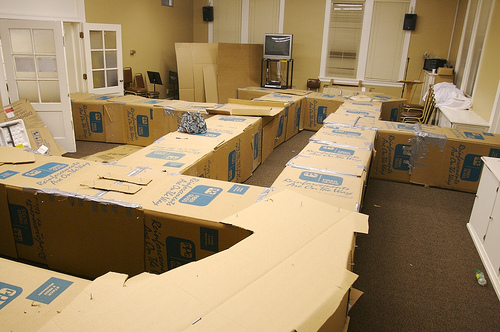Your Personal Funsmith
We have personal trainers, therapists, money advisors, why not funsmiths? Funsmiths help us unleash the power of play, that most vital spirit. Bernie DeKoven is a master funsmith. He is a constant river of new games, weird junkyard sports and someone who attends the serious business of having fun. In one of his wonderful blogs he imagines a greater role for people like himself. In his words:
Say you want to make something more fun – a game, a toy, your job, your company, your relationship with your spouse or kids, your life…
So you call or email or Skype your local Funsmith, and you say: “I want to make something more fun.” And you arrange to meet, by phone, by email, over Skype, at a coffee shop, or at a local park for a walk’n talk. For, say, a couple hours. For some agreed-upon, agreeable sum.
You know this Funsmith is a fun guy – warm, welcoming, caring, insightful, and most of all, playful, very playful. An expert player, in fact – someone who knows many different ways to play, many different kinds of games and many ways to play them, who knows how to have fun, how to create fun, how to share fun, how to be fun. A professional player. Someone so playful and so knowledgeable that you’d pay to play with that person – for a lot of reasons. Because it’s fun to be with that person. Because you like yourself even more when you’re with that person. Because, during the time you or your child or your parents spend together with this person, you can, without any sense of guilt or obligation, expect that that person will focus all that playful expertise entirely on them. On having fun with them. On helping them find ways to make things more fun.
Let’s say you are the one who goes to that person, every week, for a couple of hours, every other week, or month or whenever you feel like going. Even if all you did was play together, it’d be worth it. Because it’d be fun – real, meaningful, personal, deep fun. And because this professional player always makes the rules negotiable, adjustable, the only goal being to find a way to play so that you can all enjoy the game, all be challenged, together – it’d be a lesson in how you, too, could make things fun again, even if they were only games.
But let’s imagine that you go further, you and this person, and you also focus on how you might make other things more fun. Not just games, but things like work, school, relationships.
Let’s say that, G*d forbid, you’ve lost someone. Someone close. Or you’ve lost something important to you – like your money, your job, your house, your wallet, your pet. And you’re still grieving. And you go to this play expert, and play. It’s almost a miracle, you know, how you and this expert player can manage to set all that grief aside for a while, and actually have fun again. Which reminds you, naturally, how many ways are still open for you to feel whole again, feel at play, in play. That, alone, would be worth whatever it costs. Just being reminded, experiencing yourself at play again. And if you want, you and this expert player could also spend some time thinking about other opportunities for fun in your life, for bringing fun to your children, parents, spouse, neighborhood, community. Or thinking about what you’ve already tried, and what was the most fun, and what you could do next.
Once you find something that you want to play again and again together, something that remains fun for you both, you can begin to explore other games, expand the repertoire of games that you can both play together. It’s not about what you want to play or what your play expert wants to play but about what you can play together.
Sure, things will come up, and you’ll want to talk about them, but the more that you can focus on having fun together, the more successful you will be.
This isn’t therapy. Or if it is, it’s not about the talk. It’s the fun. That’s the whole point of it. It’s not about playing so that you talk about all the painful things in your life. It’s about playing so that you can learn to play more with the rest of your life. It’s what I call the practice of Deep Fun. And the practitioner is what I call a “Funsmith.” Which, coincidentally, is the very thing I’ve been calling myself.

Cardboard maze via Daniel Weber


